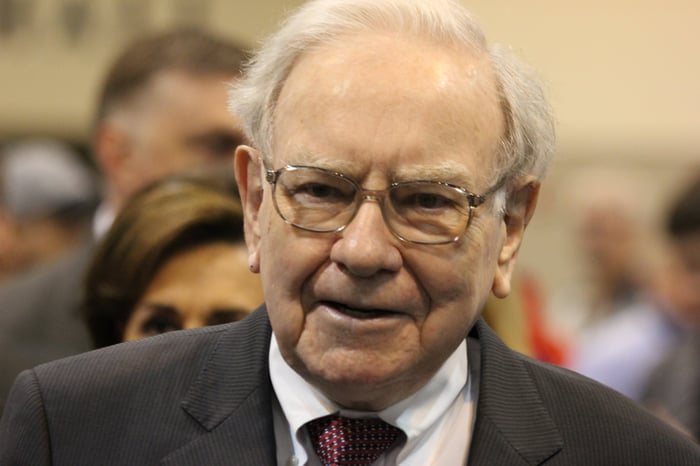You won’t find Warren Buffett chasing the latest stock market trend, but many of the stocks held in Berkshire Hathaway’s portfolio are benefiting from artificial intelligence (AI).
Warren Buffett led the Berkshire Hathaway (BRK.A 1.17%) (BRK.B 1.33%) holding company since 1965. He likes to invest in companies with steady growth, reliable profitability, strong management teams, and shareholder-friendly initiatives like dividend payments and stock buyback programs.
That strategy is working: Berkshire delivered a 4,384,748% return between 1965 and 2023. That translates to a compound annual gain of 19.8%, which is nearly double the 10.2% annual return of the benchmark S&P 500 index over the same period. In dollar terms, an investment of $1,000 in Berkshire Hathaway stock in 1965 would have grown to over $43 million, whereas the same investment in the S&P 500, with dividends reinvested, would be worth just $312,333.
Buffett isn’t the type of investor who chases the latest stock market trends, so you won’t find him piling into red-hot artificial intelligence (AI) stocks today. But three stocks Berkshire already owns are set to benefit tremendously from AI, and they account for more than 45% of the conglomerate’s entire $398.7 billion portfolio of publicly traded securities.
Image source: Getty Images.
1. Snowflake: 0.2% of Berkshire Hathaway’s portfolio
Snowflake (SNOW 0.11%) developed its Data Cloud to help businesses aggregate their critical data onto one platform, where it can be analyzed more effectively to extract its maximum value. The service was designed for use by large, complex organizations that work with multiple cloud providers (like Microsoft Azure and Alphabet‘s Google Cloud), a situation that often leads to the creation of data silos.
Then last year, Snowflake launched its Cortex AI platform, which allows businesses to combine ready-made large language models (LLMs) with their own data to create generative AI applications. Cortex also comes with a suite of AI tools such as Document AI, which allows businesses to extract valuable data from unstructured sources like invoices or contracts, and Snowflake’s Copilot virtual assistant, which can be prompted using natural language to provide valuable insights across the Snowflake platform.
In the company’s fiscal 2025 first quarter, which ended April 30, Snowflake’s product revenue came in at $789.6 million, a 34% increase from the year-ago period. That’s a robust growth rate at face value, but it continued a trend of deceleration from prior quarters. Though Snowflake continues to invest heavily in growth initiatives like marketing and research and development, it is acquiring new customers at a slowing rate, and its existing customers are expanding their spending with it more slowly.
Berkshire Hathaway bought its stake in Snowflake around the time of the data cloud specialist’s initial public offering in 2020, so it likely paid around $120 per share. The stock soared to as high as $392 in 2021, but it has since declined by 63% from that level and now trades at $142. Unfortunately, due to the company’s slowing growth, the stock still appears to be quite expensive, so this is one Berkshire pick investors might want to avoid (for now).
2. Amazon: 0.5% of Berkshire Hathaway’s portfolio
Berkshire bought Amazon (AMZN 1.22%) stock in 2019, and Buffett has often expressed regret that he didn’t spot the opportunity sooner. Amazon was founded as an e-commerce company, but it expanded into cloud computing, streaming, digital advertising, and now, AI.
Its Amazon Web Services (AWS) cloud division designed its own data center chips which can be up to 50% cheaper for AI developers to use compared to its other infrastructure powered by Nvidia‘s chips. Plus, the Amazon Bedrock platform offers developers a library of ready-made LLMs from some of the industry’s leading start-ups, in addition to a family of LLMs called Titan that Amazon built in-house.
In essence, AWS wants to become the go-to destination for developers looking to create their own AI applications. Various Wall Street forecasts suggest AI will add anywhere from $7 trillion to $200 trillion to the global economy in the coming decade, potentially making it Amazon’s largest opportunity ever.
Berkshire Hathaway owns a $2 billion stake in Amazon, representing just 0.5% of the conglomerate’s stock portfolio. AI could drive substantial growth for the company over the long term, so if Buffett wished that position was larger before, he might be kicking himself for not adding to it sooner after this next chapter unfolds.
3. Apple: 44.5% of Berkshire Hathaway’s portfolio
Apple (AAPL 2.16%) is Berkshire Hathaway’s largest position by far. The conglomerate has spent around $38 billion accumulating shares starting in 2016, and its position is now worth $177.6 billion — even after it sold 13% of its stake (for tax reasons) earlier this year. Apple makes some of the world’s most popular devices including the iPhone, iPad, Apple Watch, AirPods, and the Mac line of computers.
The company is entering the world of AI with its new Apple Intelligence software, which will be released alongside the iOS 18 operating system in September. It was developed in partnership with OpenAI, and it’s set to transform the user experience for Apple’s devices. Its Siri voice assistant will lean on the capabilities of ChatGPT, as will its writing tools like Notes, Mail, and iMessage, to help users rapidly craft content.
There are more than 2.2 billion active Apple devices worldwide, meaning this company could soon become the largest distributor of AI to consumers. The upcoming iPhone 16 could drive a significant upgrade cycle, because it is expected to come with a powerful new chip capable of processing AI workloads on-device.
Apple ticks all of Buffett’s boxes for a stock pick. It has grown steadily since Berkshire first invested in 2016, it’s consistently profitable, it has a resolute leader in CEO Tim Cook, and it returns truckloads of money to shareholders through dividends and stock buybacks. In fact, Apple just announced a new buyback program worth $110 billion — the largest in the history of corporate America.





















